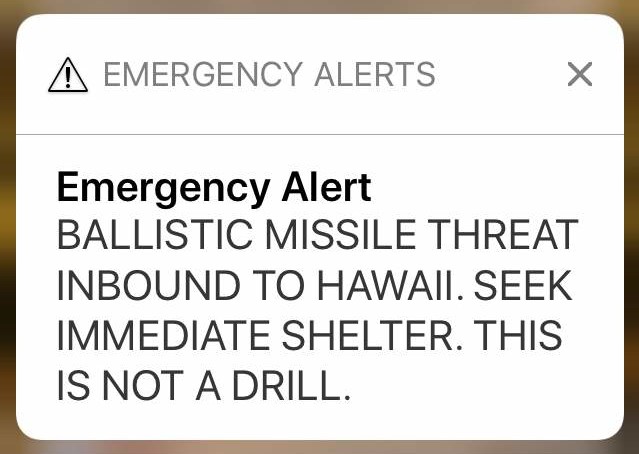Hawaii False Alarm: “For Cause” Termination for Employee?

Hawaii False Alarm About Incoming Missile Leads to Mass Panic
By now we’ve all heard the story of how panic gripped Hawaii, and waves of hysteria were sent rippling through much of the United States and globally, when a government employee at the Hawaii Emergency Management Agency accidentally activated a missile alert system. Tens of thousands of Hawaii residents were issued warnings about an inbound missile, and advised to seek shelter immediately.
One can only imagine what it must have felt like being faced with the very real possibility of impending annihilation. How would you spend those last precious minutes? Reports are that many called or messaged their loved ones for a last goodbye, while others scrambled to arrange their emergency supplies or find shelter.
Regardless of the individual response, it is undeniable that the event was a source of profound stress and anxiety for many. These feelings were soon replaced by outrage and anger when it was revealed that the warning was not real; it was just a false alarm. Whoops.
Hawaii False Alarm: What Happened
Government and agency officials across the board have called for those responsible to be held accountable, with some even suggesting the employee who set off the warning should be fired. State officials have suggested that the employee in question, who has 10 years of service, has been temporarily reassigned.
Evidently, the warning was sent out because the employee was trying to initiate a routine internal test of the missile warning system, but clicked on the wrong box of a drop down menu on his computer.
As far as mistakes go, it’s certainly a doozy. But is it something that should cost the employee his job?
Is a “For Cause” Termination Justified?
Terminating someone for cause has been referred to as the “capital punishment” of employment law in Canada. It is the most serious consequence an employer can administer, and therefore it rightly requires the employer meet a high bar in order to do so. Unfortunately, there is no bright line rule for what constitutes cause. Every case depends on its own facts. Context is key. Nevertheless, our courts have been consistent in finding that a minor mistake generally will not justify a for cause termination.
I think it’s reasonable to say that many of us have accidentally clicked an incorrect button or punched in the wrong number on our computers at one time or another. In an age where so much of our workday is logged on our computers, it’s almost inevitable that mistakes will be made. It just so happens that most of us don’t have a button to trigger an inbound missile alert.
If an employee does make a minor mistake that leads to significant consequences, it speaks more to the employer policies and safeguards in place than the employee’s individual culpability. Employees should, of course, learn from their mistakes and take adequate precautions so as not to repeat them, but employers also have an obligation.
Employers should work with their employees, perhaps by offering additional training and education, to reduce the risk that a mistake will be repeated. Employers should also ensure that any contributory factors that may have led to the mistake are remedied. For example, Hawaiian officials say they have commenced a thorough review to determine how this can be avoided in the future, and they have already implemented a two-person requirement for issuing a missile warning.
How to Properly Discipline an Employee
Even in cases where the fault lies solely with the employee, employers would still be wise to follow a system of progressive discipline before attempting a termination for cause. The employee should be provided adequate warnings, advised that the conduct is unacceptable and could result in termination if it continues, and given time and the necessary instruction to correct the issue.
If an employee has been terminated for cause, they should consider obtaining legal advice. An experienced employment lawyer will be able to review the facts and advise whether the employer’s actions in terminating the employee were appropriate. If an employee’s conduct does not actually rise to the required level of cause, their termination will then be considered a termination without cause. The employee would be owed full severance pay. If they do not receive a fair amount of severance, they will have a potential claim for wrongful dismissal.
Use Our Interactive Resources
Pocket Employment Lawyer
Use our interactive resource to determine if your employment rights have been violated or if your long term disability claim was inappropriately denied.
Use Pocket Employment LawyerSeverance Pay Calculator
Accurate. Anonymous. Free. Find out how much severance you are owed in Ontario or B.C.
Calculate Severance Now




